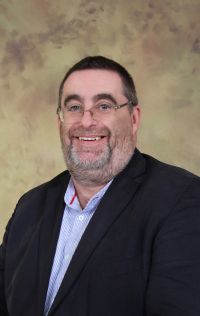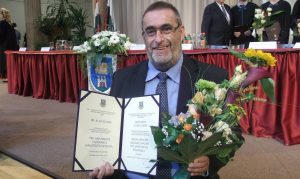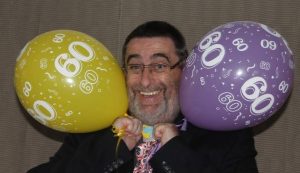Professor of fun
I was talking to one of the most iconic figures of the Department of Tourism, Dr Alan Clarke who came from Great Britain several years ago to teach and live in Veszprém.
 Please, tell me something about yourself. Where did you come from, why did you choose this career?
Please, tell me something about yourself. Where did you come from, why did you choose this career?
It was an accident. I was born in 1956 in Sheffield which is as far away from the seaside as you can get in the United Kingdom. I went to university to became a personnell manager, but they taught personnel management at 9 o’clock on Monday morning and I realised quite quickly I could not cope with my problems at 9 on a Monday morning, never mind about everybody else’s. So, I transferred to sociology and politics which was a lot more challenging about world views than doing personnel management. I got involved in a campaign about street crime which led me to work on criminology as a PhD topic. It was also accidental because I took a final year law tutorial, when my supervisor participated in a conference in Canada and I did a session on the history of the police force in the UK. Nobody was interested because it was an extra course for the students. From nowhere I got an idea to discuss the topic by using television crime series and I succeeded. I wrote my dissertation as a semiological study of crime series. Afterwards I got a job at the police authority because I was expert on doing PR work. However, the system was changed by the government so I moved back to academic fields. My university sent me to a conference to promote itself. During the conference, I realised that there was a group of people who spent their life working on what people will do to have fun. I thought that this was much better than talking about local government. So I found out whether I could teach leisure management and I got a job where I did courses with a group of master students who were working in leisure management. The tourism job was quite bizarre, my county was missed of a map by the British Tourism Authority. I did a tourism audit about what was valuable in terms of tourism resources and I became a consultant. Then I started to work half time in the university and half time in the consultancy. I travelled the world and learned a lot and finally I became a tourism person. My generation did not have the possibility to learn tourism; I learned everything on the job.
So you worked for a lot of institutions before you came here. What kind of jobs have you had?
Yes, I was lecturer at the Open University, then I went to the University of Sheffield, afterwards I moved to North London and later I ended up in the University of Derby as an assistant Dean of Research and Development in the Business School. We established a PhD school in Derby, and turned the institution to a real university with grants, projects, using external examiners from the best universities, and so on. I was also a Senior Policy Research Officer for the County Council in South Yorkshire. Some of these jobs were connected to leisure and some of them to tourism but all of them were about explaining and unpacking complex subjects.
How did you find Veszprém and the University of Pannonia?
Well, love has a lot to answer for. We were doing a European project about cities which were bypassed by tourism, DETOUR. Veszprém was represented by a Tourinform worker called Ágnes Raffay. I came to the University of Veszprém to give lectures within the project. They liked me and I quite liked them, furthermore, they wanted a senior academic in tourism to launch the master‘s program. Finding a Hungarian person to do this was difficult in those days, so 13 years ago I moved here and started to work.
What did you think about Hungary that time?
Hungarians reminded me to the Irish part of my family. They ate a lot, drank a lot and sang a lot. The pace of life was wonderfully neat. Because of language gaps I didn’t have to do many business meetings which created a lot of time for me to do research and effective things within my tourism networks. I did not want to be head of department again as I had already done this in London and this freed me up to do more interesting things. I did not want to do the academic management job anymore; I was preferring to concentrate on projects.
Why did you decided to stay here for a longer period?
Actually, I have a daughter and 3 sons. According to our plan, when Daniel needed to start kindergarten we moved to Hungary to ensure he became bilingual. Nowadays he and his younger brother are still in school. Who knows what will happen after their graduation. Our idea worked because both of them have an amazing ability to switch between languages. This multinational situation provides them another major bonus because we celebrate the Hungarian Christmas on the 24th but we also celebrate the British one on 25th of December.

What did your family think when you moved here?
By that time my oldest son and my daughter were already adults. I can see them quite regularly, as keeping in touch is quite easy nowadays with all the technology. British families are different from Hungarian ones. Members of a Hungarian family want to see each other all the time; it is different in the UK. When you don’t see your family members every day, it doesn’t mean that you don’t think of them. The closeness of Hungarian families was quite strange for me when I moved here, but was quite nice.
I refer to Hungary as my home. I am happy to be here, I feel very comfortable. I have no plans to move back to the UK permanently (unless somebody would donate me an apartment on the seaside). It is also nice to see my two youngest sons growing up in a village near Veszprém where there is no threat. It would be different for them in the UK because there are things what they don’t get here but there are other things to compensate them.
So you are happy to work and live here.
Yes, absolutely! I have been given a wonderful opportunity to do what I was first asked to do when I joined the University of Sheffield many years ago, which was to teach and to research. My life became very complicated in the UK by being an assistant dean and a faculty research director. Actually, at the end I had more meetings than teaching opportunities. It changed when I came here and I’d got enough time to do serious academic work. We also carried out exciting things here, such as running an English programme, and the idea of having qualifications all the way through. Students do not have to leave the University of Pannonia if they do not want to. We have introduction courses, BA, MA and PhD in tourism. I only miss the interaction with the industry, but my Hungarian is still not good enough to negotiate about projects. Hungarian is a very difficult language!
What are the differences between the University of Pannonia and the universities in the UK you worked at?
There are two big differences. On one hand, it starts from being a scientific university. Most of the places where I worked in the UK started from the arts which resulted in differences in how the places were set up.
The second biggest difference is the attitude towards students and what students are. The universities in the UK discovered students as stakeholders. A part of taking students seriously in those universities is the facilities they have. Almost every British university now has good coffee bars, dining and sport facilities. Moreover, the connection between the university and everyday life is stronger. For instance the University of Derby developed a whole atrium area with restaurants, coffee bars, shops, hair dressers, and so on. In the UK, I had the possibility to sit down and have coffee or tea with my students at the end of every corridor. I think that is something what we miss here because the teaching rooms are set up for teaching and not for discussions.
Would you be so kind to share your thoughts about teaching and being a lecturer?
My job is not only to teach because anybody can read the book and present the lecture. The purpose is to get people to think and critically engage in subjects. I hope, what I do is entertainment as well as education and I hope it is fun. In my opinion, if I am having fun, the probability that my students will have fun is higher. If I stop enjoying the lecture, I don’t think that my students will enjoy it. Happy people are more productive than unhappy ones. So, if they are having fun they will work harder than they might think.

